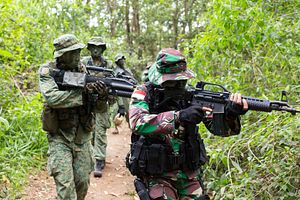Last week, Singapore and Indonesia carried out a new exercise in counterterrorism, an area of growing concern for the two sides. The interaction highlighted the ongoing collaboration by the two countries in the defense realm in spite of the lingering challenges they continue to face in managing their broader relationship.
As I have pointed out before in these pages, though the defense ties between Indonesia, Southeast Asia’s largest state, and Singapore, the subregion’s smallest, have tended to be prickly historically speaking, both sides still maintain a cordial security relationship that includes the usual components, including visits, exchanges, and exercises.
Some of these interactions have been in the spotlight this year more so than usual as both sides commemorate the 50th anniversary of their relationship this year. Indeed, from November 13 to November 20, both sides had held the 29th iteration of the flagship annual exercise between the infantries from both armies known as Exercise Safkar Indopura (See: “Indonesia-Singapore Army Exercise Spotlights 50th Anniversary”).
Last week saw Singapore and Indonesia holding a new, noteworthy interaction covering counterterrorism, a growing concern for both sides with the threat posed by the Islamic State and its affiliates in Southeast Asia (See: “ASEAN’s Post Marawi Islamic State Challenge”). From November 28 to 29, the Singapore Armed Forces (SAF) and the Indonesian National Defense Forces (TNI) held a counterterrorism table-top exercise (CT TTX) in Singapore.
According to Singapore’s defense ministry (MINDEF), the two-day exercise involved 27 personnel from the SAF and the TNI as well as the respective homeland security agencies. Both the SAF and TNI delegations comprised members from the Operations and Intelligence Departments, personnel from the Special Operations and Maritime Security Task Forces, and homeland security forces from the Singapore Police Force (SPF) and the Indonesian National Agency for Combating Terrorism (BNPT).
The primary objective of the exercise was to boost interagency cooperation in the area of counterterrorism by discussing and sharing potential responses to possible scenarios. In that respect, both sides went through sessions on several realistic scenarios to identify areas for improvements and further collaboration, including bomb threats in public areas, vehicles ramming into pedestrians, and gunmen launching an assault in shopping malls.
In terms of its significance, The Straits Times noted that the CT TTX was not only the first such exercise between the two countries, but the first of its kind that Singapore had held with a foreign military. It also quoted the head of the Singapore delegation, Colonel Lim Kok Hong, who is the head of the SAF Current Operations Group, as saying that both sides were “very serious and interested” in making the exercise a regular one in the future.

































